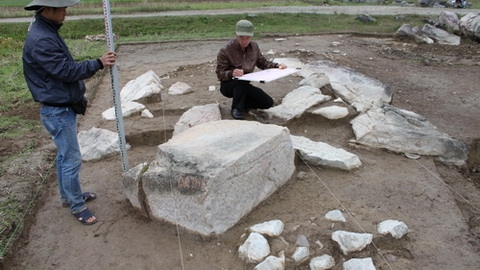 Life & Style
Life & Style

Scientists have unearthed various objects at an excavation site at Hồ Citadel in central Thanh Hóa Province, helping them to learn more about the scale and characteristics of the citadel.
 |
| Several large cube-shaped stones of different sizes have been found at the excavation site. Photo thethaovanhoa.vn |
HÀ NỘI — Scientists have unearthed various objects at an excavation site at Hồ Citadel in central Thanh Hóa Province, helping them to learn more about the scale and characteristics of the citadel.
Several large cube-shaped stones of different sizes have been found at the excavation site, together with many pieces of building materials, such as brick and tiles.
The remnants of a canal were found at a depth of 0.3m-4.4m in the north of the citadel and at a depth of 0.3m-4.6m in the south of the citadel.
Based on the findings, scientists concluded that the site hosts a system to defend including the canal in the north of the citadel, built by stones of small sizes and clay mixed with gravel. The canal measured 0.6m in width and 7m in depth at the deepest point.
Scientists have also found daily kitchen utensils made from terra cotta and porcelain and metal coins dating back to the Lê (1428-1788), Nguyễn (1802-1945), Trần (1225-1400) and Hồ (1400-1407) dynasties.
In the next few months, scientists will conduct further research in the east and the west of the citadel to understand the general layout of the canal system surrounding the citadel.
Citadel of Hồ Dynasty (also called Tây Đô castle or Tây Giai castle) was constructed by the Hồ Dynasty (1400-1407).
It is located in Tây Giai Commune, Vĩnh Lộc District in Thanh Hóa Province.
Tây Đô castle is rectangular in shape. Its north-south side is 870.5m in length and its east-west side is 883.5m in length. There are four gates: one at the south (main gate), one at the north (back gate), one at the east (left gate) and one at the west (right gate). The southern gate is 9.5m high and 15.17m wide.
The castle was constructed from stone blocks, each of which is 2 by 1 by 0.7m in size, on average.
Except for its gates, the castle is mostly ruined. The citadel was given the status of a UNESCO World Heritage Sites on June 27, 2011. — VNS




